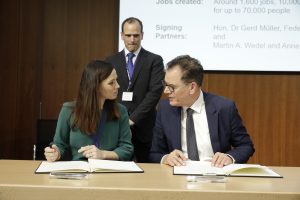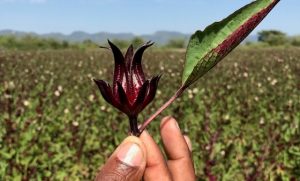A promising partnership: Martin Bauer Group and BMZ boost ecological agriculture in Africa
The Martin Bauer Group and the German Federal Ministry for Economic Cooperation and Development (BMZ) have laid the basis for a partnership set to last until 2029.
Anne Wedel-Klein and Martin A. Wedel of MB-Holding’s executive board and Federal Minister Dr. Gerd Müller are today signing a declaration of intent in Berlin, following on from the G20 Investment Summit – German Business and the CwA Countries, which took place three weeks ago. Within this partnership with the BMZ, the Martin Bauer Group will establish demonstration farms in several African countries to show ecological and sustainable agriculture in practice and to improve the living standards of local farm workers, small farmers, and wild harvesters. The agreed measures will be a practical implementation of goals 2 and 15 of the United Nations Sustainable Development Goals (SDG), “Zero Hunger” and “Life on Land.” By offering its financial support to the project within a SDG Compact, the BMZ is honoring the Martin Bauer Group’s commitment to sustainable supply chains.

Anne Wedel-Klein and Federal Minister Dr. Gerd Müller as well as Martin A. Wedel (standing) sign the SDG Compact.
Martin Bauer Group: pioneers in sustainable cultivation and wild harvesting
The Martin Bauer Group offers botanical products, powders, extracts and flavorings for teas, beverages, food, and animal nutrition. It sources over 200 raw materials from more than 80 different countries. This fourth-generation family business is a pioneer in sustainable cultivation and wild harvesting, and has many years of experience in operating sustainable supply chains. Over ten years ago, it developed mabagrown®, its own standard for sustainably sourced herbs and fruits. This standard is certified by the independent UTZ certification pro-gram for sustainable farming.
Good partners: demonstration farms to receive up to €10 million in funding
The Martin Bauer Group is going to evaluate the feasibility of cultivating organic-quality medicinal herbs, spices and aromatic plants in potential locations from Morocco in the north of Africa to Namibia in the south. It will conduct trial cultivation in selected regions. Once suitable sites are found, the Martin Bauer Group establishes demonstration farms that employ up to 1,600 people. The farms also have training centers so that as many as 10,000 farmworkers, small farmers and wild harvesters can be instructed in the basics of ecological farming and sustainable wild harvesting. When the families of the workers are taken into account, as many as 70,000 individuals benefit from the farms. At the same time, the Martin Bauer Group initiates projects to improve quality of life in the local communities.
The German Federal Ministry for Economic Cooperation and Development (BMZ) is supporting the entire package of measures as part of its develoPPP.de program. It is providing 35 percent of the project costs, up to a maximum of €10 million. One of the official partners commissioned by BMZ to implement the program on its behalf is development financing company DEG, which is advising the Martin Bauer Group and providing support. DEG and the Martin Bauer Group have already worked together on successful development projects in Zimbabwe, Egypt, and other African countries.

Unlocking the potential of African agriculture will be an important factor in reducing poverty on the continent.
Agriculture in Africa: unlocking development potential
The BMZ and DEG specifically support private companies, such as the Martin Bauer Group, that are committed to boosting African agriculture. Agriculture is crucial for communities in Africa – around 60 percent of the continent’s population work in the sector. However, that is often purely subsistence agriculture that yields barely enough for small farmers to feed themselves and their families. And yet, the conditions in many African countries are often eminently suitable for cultivating high-quality produce for premium markets – such as organic herbs and spices that require a healthy agricultural ecosystem. Unfortunately, almost everywhere there is a lack of the necessary expertise, equipment and financial means to successfully establish ecological cultivation practices and increase productivity. Unlocking the potential of African agriculture will be an important factor in reducing poverty on the continent.